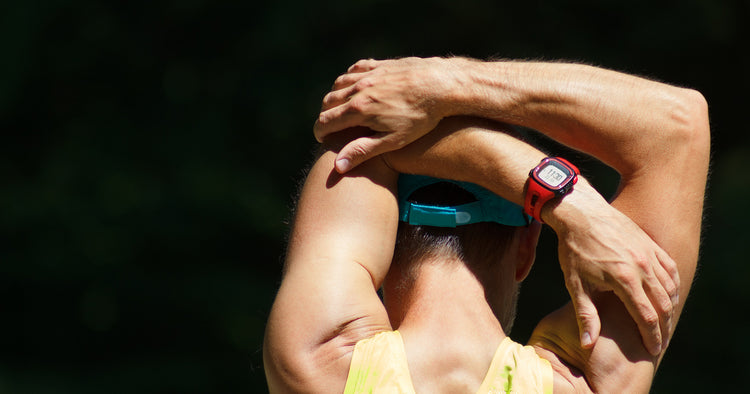Stretching is probably the first thing you cut out of your fitness schedule when you’re busy – but we all know we shouldn’t. In this article, learn more about the benefits of static stretching, how it’s different from dynamic stretching and when to add it to your workout.
What is Static Stretching?
Static stretching involves stretches that you hold in place for a period of time, without movement. It can relieve tight muscles, while increasing flexibility and range of motion so you can move better while completing both daily tasks and exercise!
Benefits of Static Stretching
1. Increase Flexibility
Stretching can help increase your flexibility. Flexibility involves loosening your muscles to increase range of motion. By increasing your range of motion you’ll be able to move through the correct range of motion with more comfort and ease – making daily tasks and exercise easier.
2. Decrease Muscle Pain & Stiffness
Having tight or overactive muscles can lead to muscle pain and stiffness, making it uncomfortable to complete even daily tasks. Static stretching is an effective way to decrease tightness and promote comfort.
3. Improve Performance
By regularly stretching, you’ll avoid tight or overactive muscles which can lead to improper movement patterns and even injury. When your muscles are overactive from a tough workout, it’s not just that they feel tight, they are tight. Overactive muscles can shorten, pulling on joints and other muscles up and down the chain. As you can imagine, this discomfort can lead to pain and improper movement patterns. The good news is, with regular static stretching you can lengthen your muscles, and maintain them at an optimal length for your best performance. Fast track your results and performance by taking care of your muscles with regular stretching.
4. Enhance Recovery
Daily stretching can increase blood flow and improve circulation. Flushing toxins out of your muscles, and bringing in new fresh nutrients, oxygen, and blood to improve recovery.
Static Stretching vs. Dynamic Stretching
Dynamic stretching is typically done before exercise and involves active movements that bring your body through a range of motion. These movements should be similar to the movements you plan to perform during your workout and are designed to get your body warmed up and primed for exercise. For example, a runner might jog in place, or perform leg swings, or a basketball player might perform arm circles before playing a game.
Static stretching on the other hand should be done at the end of your workout, when muscles are their most warm and pliable – this is when you’ll get the best, and deepest stretch. It involves stretches held in place for a period of time, without movement.
How to Get the Best Stretch
At the end of your workout when your muscles are warm and pliable, finish with a cool down including static stretches. When selecting static stretches to include in your routine, choose stretches that target muscles you worked during your workout – for example, after a leg day at the gym, you’d want to give a good stretch to your calves, hamstrings, quads, and glutes.
Once you’ve selected your stretches, hold each stretch for 30 seconds. Repeat each stretch 2-3 times for best results.
A few things to keep in mind while stretching:
- Slight discomfort while stretching is normal, but you shouldn’t be in pain. If you feel a sharp pain stop stretching immediately.
- Practice gentle movement. Avoid bouncing or jerking around, as you may stretch too far and cause injury. Gently control your movement into each stretch.
- Don’t forget to breathe! Breathing can help relax both your body and mind, as your muscles relax, you’ll find you can comfortably move deeper and deeper into a stretch.
Example Static Stretches
Overhead Tricep Stretch
Shoulder Stretch
Back Extension Stretch
Child’s Pose
Seated Butterfly
Hip Flexor & Quad Combo
Kneeling Hamstring Stretch
Pretzel Glute
Lower Back Twist
25-Minute Full Body Stretch
WHY YOU SHOULD CARE MORE ABOUT EXERCISE FORM
HOW CIRCUIT TRAINING CAN HELP YOU REACH YOUR FITNESS GOALS FASTER
SHOULD YOU BE CROSS TRAINING?
MICRO HIIT WORKOUTS
Recommended Products:
Folding Gym Mat
Add to Cart
Yoga Mat Extra Wide and Length
Add to Cart
Tri-Folding Mat
Add to Cart,

